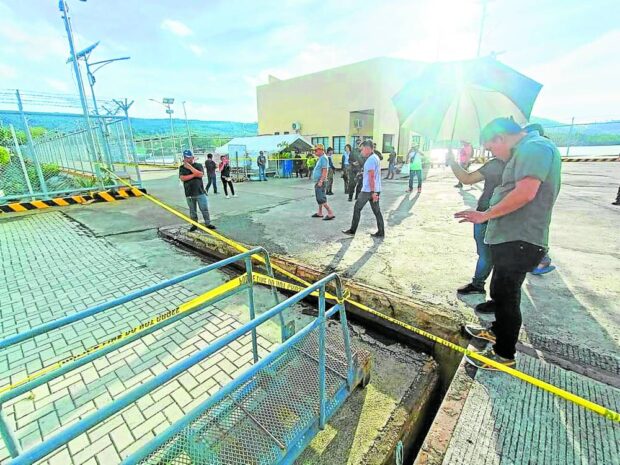Magnitude 6.8 quake renders Glan port ‘unsafe’

INSPECTION | Sarangani Gov. Ruel Pacquiao inspects on Saturday the damage wrought by the magnitude 6.8 earthquake on the roll-on, roll-off ramp of Glan port. (Photo from the Sarangani Provincial Government)
GLAN, Sarangani, Philippines — The Philippine Ports Authority has suspended the operation of the port here after authorities found that its facilities have become “unsafe for use” after these were damaged by the magnitude 6.8 earthquake that hit Mindanao on Friday.
Cesar Dataya, port manager for Socsargen (South Cotabato, Sarangani, General Santos), said in a Nov. 29 advisory that the quake “resulted in severe damage of the vital facilities and structures” of the Glan port, which could not be reopened until its repairs have been completed.
The Philippine Institute of Volcanology and Seismology recorded Friday’s quake was at Intensity 7 in Glan, the highest in the scale of intensities, which is categorized as destructive.
The Glan port is among the five Mindanao harbors included in the network of ports designated as platforms for intratrade among the Association of Southeast Asian countries.
In the nine months of 2023, it catered to 552 domestic ship calls carrying close to 7,000 passengers and 27 metric tons of cargo of which 21 tons are inbound, mostly bottled products, and 6 MT outbound, mostly copra.
READ: OCD reports 1 killed due to 6.8 magnitude earthquake in Sarangani
Limited int’l port
In 2005, the port was declared a “limited international port,” generating massive investments from the national government for facilities improvement, including the construction of a roll-on, roll-off ramp. The temporary closure of the port is expected to increase the cost of transporting the town’s produce, mainly copra, milkfish, shrimps, banana, and mango.
Apart from the port, the municipal hall of the town was also assessed to be “unsafe for occupancy.” Rey Francisco, the Sarangani district engineer of the Department of Public Works and Highways, said it would take some P20 million to repair the municipal hall.
Fortunately, Glan’s historic marker of original town settlers was spared by the quake.
Glan is classified by the National Historical Commission as a heritage town, one of the pioneer colonies set up by the national government in 1917, designated as Agricultural Colony No. 9. Migration into Glan was mainly by Cebuanos, adding to the native Blaan and Maguindanao population.
In Sarangani’s Malapatan town, Mayor Victor James Yap Sr. said they were poised to declare a state of calamity given the massive destruction in the town, including the collapse of the fish port.
The municipal hall, for one, would need at least P20 million to repair if given the go signal by structural engineers, he said.
Sarangani Gov. Ruel Pacquiao said they were also contemplating a calamity declaration for the province and had suspended classes and work in government offices on Monday and Tuesday to give way to a thorough assessment of the structures.
A report from the Provincial Disaster Risk Reduction and Management Office (PDRRMO), showed that 1,599 houses in the towns of Glan, Malapatan, Alabel and Maasim were damaged, along with several public infrastructure; and counted 79 people seeking medical attention for injuries.
The quake affected six of the seven towns of the province—Glan, Malapatan, Malungon, Maasim, Alabel, and Maitum, the PDRRMO said.































